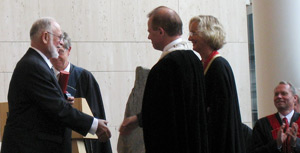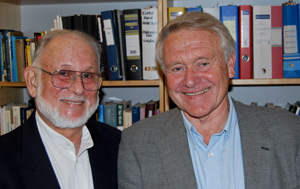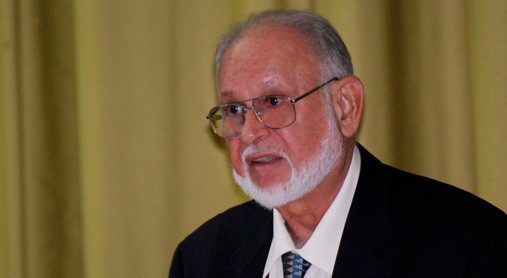Professor Orlinsky, an internationally recognized expert in the field of psychotherapy research, is the 5th honorary doctor conferred by the Department of Psychology since Henry A. Murray in 1969, and was in Oslo on September 1st and 2nd to receive the degree and present a public lecture at the Department of Psychology as part of the University of Oslo’s 200th anniversary celebration.
Therapy as an inter-personal relationship
In his lecture, Orlinsky emphasized how important it is that clients in therapy develop a person-to-person relationship with the therapist in which they feel understood, supported, and challenged.
– To be effective, therapists have to create a “personal relationship” within the context and confines of their professional role. Good therapists will do that no matter what method they use, Orlinsky said, but to achieve that solid relationship, you have to connect on an emotional level.
He noted that most people hold an implicit view of therapy as the application of certain techniques or procedures, and view the effectiveness of therapy as inhering in those techniques, as it does in medical treatment.
– Yet lots of research evidence accumulated over many years shows that while techniques contribute something, they are not as important as the experience of therapeutic relationship that the client has in treatment, Orlinsky stated.
In his view, therapists must be able to engage the clients collaboratively, earn their trust and confidence, show genuine concern, and be committed to care for clients as long as they need it. The therapist offers competence in methods and techniques, but above all must have interpersonal skills of empathy, tact, and compassion.
Personal life and psychotherapy

Orlinsky notes that the problems which bring clients to psychotherapy most often involve the client’s self-experience in the formative and current relationships of personal life. He distinguished these intimate
“personal” relationships from the typically “impersonal” relations that prevail in the economic, political and community sectors of modern society, where individuals are valued primarily for what they do (i.e., the functions they perform) rather than for who they are as persons.
By contrast, our value as unique, irreplaceable selves is paramount in the close relationships of personal life that have a major impact on people’s emotions and sense of meaning in life. Psychotherapy can help individuals who experience significant inner stress or conflict, or who fail to thrive in the relationships of personal life.
– It does so largely through the reparative impact of the therapeutic relationship, he believes.
The role of therapy in modern society
The question that Orlinsky sought to address in his lecture is why the therapeutic relationship has this ‘healing’ effect on clients who experience their therapists as perceptive, empathic, skilful and caring.
In answering, he referred to our species biology which made the support, protection and guidance of others necessary for survival through the formative years of childhood, and also cited the French sociologist Emile Durkheim who showed that an energizing sense of “communal spirit” and morale is generated through social interaction leading to formation of what Durkheim termed “mechanical solidarity”.
Orlinsky describes this as "personal communion".
– What happens in a whole society or community can help understand what happens just between two persons in a therapeutic context. In modern secular societies, experiences of “personal communion” and the morale generated by it occur mainly in the relationship of personal life. That is why our personal relationships are so essential, and why problems that arise in them cause so much distress, leading many to seek help in a therapeutic relationship, Orlinsky explains.
The circle of close relationships that define personal life itself is surrounded and influenced by the wider economic, political and social conditions in society as a whole, and these affect the degree of stress that persons experience through their levels of social cohesion and social control. The optimal conditions for individual wellbeing provide a balance of social involvement and individual identity, communal responsibility and personal autonomy.
But in modern societies and cultures, some social milieus typically create chronic stress on a daily basis, as in work that is experienced as repetitive, pressured, and personally meaningless; and, at times, create acute distress during economic crises, political upheavals, and periods of rapid social change.
Globalization too has led to modern societies becoming multicultural, with consequent strains on social and cultural institutions. This an emerging challenge for psychotherapy, and correspondingly the need for therapists to know about socio-cultural factors and differences has grown. If therapists aren’t sensitive to these factors, the empathic communication and trust needed in the therapeutic relationship may not develop.
Interdisciplinary education and research on psychotherapists
Professor Orlinsky spoke of the need for competency that goes beyond the methods and the concepts of psychological science, to appreciate the socio-economic and cultural factors influencing patients’ lives, and the need for psychotherapy education to incorporate knowledge from the social, humanistic and biological sciences.

He supports an integrative research-based approach to therapy, and has spent decades encouraging therapists and researchers to meet and share thoughts and experiences. To further this, he co-founded the Society for Psychotherapy Research in 1968, which created an open forum for leading researchers and students of psychotherapy, and for the past 20 years has served as principal coordinator for a collaborative international study of psychotherapists that gathered data on the characteristics and development of therapists in more than 30 countries.
